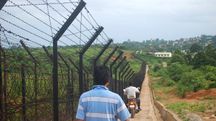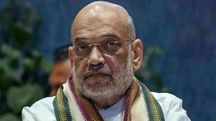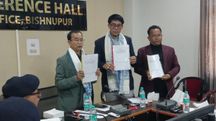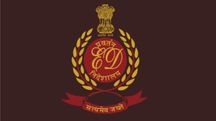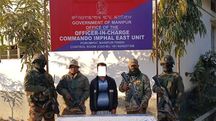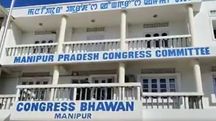Why Manipur government could not pass the bills wanted by tribal student groups
The All Tribal Students’ Union Manipur announced an economic blockade to protest against the Manipur (Hill Areas) District Councils sixth and seventh amendment bills that they say will fail to provide financial and administrative autonomy to the hill region.
 All Tribal Students’ Union Manipur (ATSUM) protest on August 7
All Tribal Students’ Union Manipur (ATSUM) protest on August 7Manipur’s hill districts came to a standstill last week when the All Tribal Students’ Union Manipur (ATSUM), the apex body of the state’s tribal students, announced an economic blockade along the national highways in the hill districts to demand the tabling of the draft Autonomous District Councils (ADCs) Amendment Bill, 2021, recommended last year by the Hill Areas Committee (HAC).
Violence erupted in Bishnupur district after the state’s BJP government introduced two different bills in the monsoon session of the assembly, which ended on August 5. While the sixth amendment to the Manipur (Hill Areas) District Councils (Sixth Amendment) Bill, 2022, which has increased the number of ADCs from six to 10, was passed by the assembly, the seventh amendment, which deals with devolution of power, was referred to the HAC.
The state government said the 2021 bill had lapsed and was not legally viable. In response to the violence, the government suspended mobile, internet and data services in the state for five days. Police arrested five executive members of ATSUM.
Meanwhile, the blockade choked supplies to the non-tribal majority in the Imphal Valley, which is surrounded by hills where the tribal people live. This development also marked the return of economic blockades to Manipur. Such blockades had become a regular feature between 2012 and 2017 when the Congress was in power.
Manipur has long witnessed conflict and mistrust between the Hills and the Imphal Valley. The six valley districts, dominated by the Meitei community, account for just over 11 per cent of the geographical area but are home to 57.2 per cent of the state’s total population of 2.8 million. The 10 hill districts, dominated by Naga and Kuki tribes, are home to 42.8 per cent of the population. Ethnic tension between Meiteis and the tribal communities often dictates political discourse in the state. The discontent in every region has given birth to ethnicity-based insurgent groups.
Yet, in last five years, ever since chief minister N. Biren Singh took charge, the state had not witnessed a single blockade. Singh even launched the ’Go to Hills‘ programme to bridge the gap between the hills and valley areas. But ATSUM leaders now feel betrayed as they claim the two bills introduced during the monsoon session cannot provide financial and administrative autonomy to the hill region as envisioned by the HAC.
Article 371C of the Indian Constitution provides for autonomous administration in the hills. The HAC and district councils in the hill districts are vested with legislative powers on specified subjects and are allotted certain sources of taxation. To give effect to these provisions, Parliament had passed the Manipur (Hill Areas) District Councils Act in 1971 when Manipur was a Union Territory. The HAC-proposed bill sought to amend this law.
The state government, however, asserts that the HAC-proposed bill cannot be passed as it practically suggests division of the state by provisioning for two secretariats, two chief secretaries and independent powers to legislate. “The Constitution doesn’t permit the state government to create a new state. How can our government introduce a bill that is not backed by the Constitution?” says chief minister Singh, adding that even HAC members had realised the flaws in their proposed bill.
Ram Muivah, MLA of the BJP’s ally Naga People’s Front (NPF), has meanwhile claimed that 20 MLAs from the hill districts in the 60-member state assembly were in favour of the new bills. The NPF is a dominant party in the hill regions populated by Naga tribes.
Copyright©2026 Living Media India Limited. For reprint rights: Syndications Today

